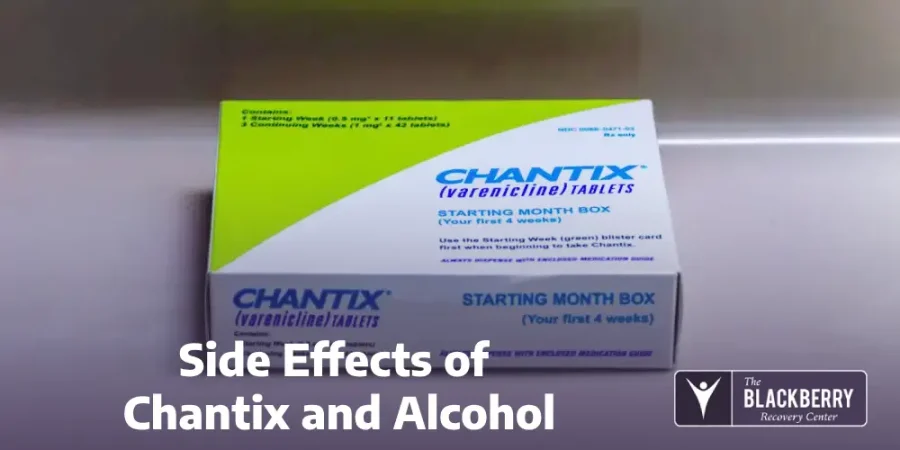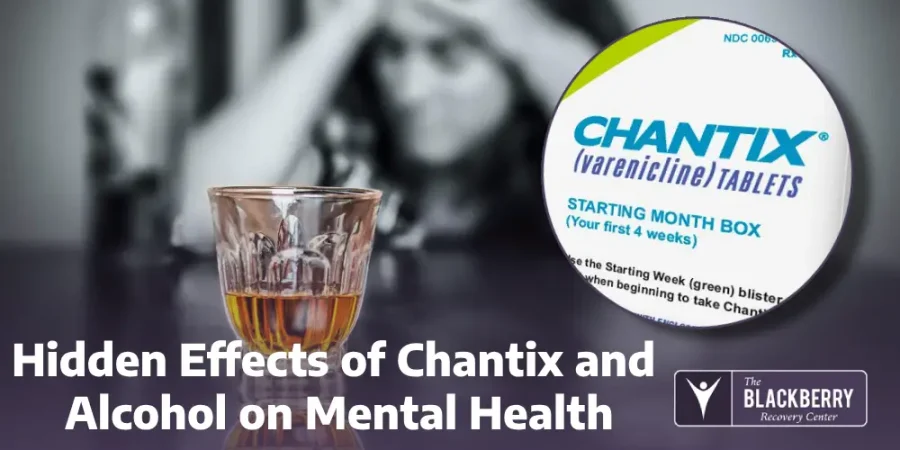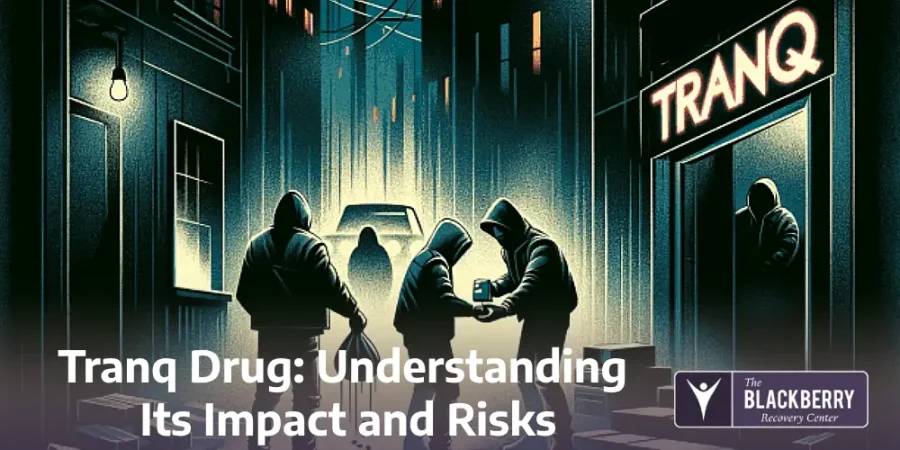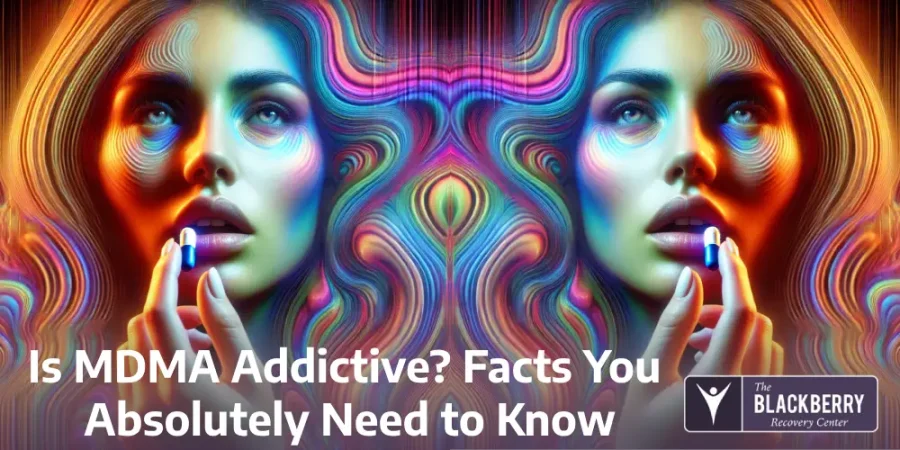Some people who take Chantix to stop smoking cigarettes have reported that this prescription medication actually assists with lowering the amount of alcohol they’re able (and that they desire) to drink. For people with an alcohol use disorder, combining Chantix and alcohol might sound like a new recovery option to stop smoking and drinking simultaneously.
However, there are hidden dangers to combining Chantix and alcohol that many users aren’t aware of. Below, we’ll review the side effects of Chantix and alcohol, why this combination may not work, and useful recovery alternatives if you are considering recovering from alcoholism yourself.
Side Effects of Chantix and Alcohol

Doctors often prescribe Chantix to their patients who are heavy smokers in an effort to help them to stop smoking. Being a nonsmoker can increase one’s quality of life dramatically and reduce the risk of developing serious health concerns that come as a result of the chemicals within cigarettes. Of course, as with any medication, Chantix comes with its own side effects. These side effects include:
- Seizures
- Heart problems
- Chantix dreams (nightmares)
- Sleepwalking
- Nausea and vomiting
- Increased chance of cancer
But a lot of people find that taking Chantix is worth the side effects to actually see results when they want to quit smoking. In short, the way Chantix works is that this medication helps to block nicotine cravings by regulating the dopamine levels that go up and down whenever somebody smokes. The less cravings someone has, the less likely they are to use the addictive substance. This theory goes for any addiction, including an alcohol use disorder. But how can Chantix help with cravings other than for cigarettes?
Interestingly, studies have shown that Chantix has a similar effect on alcohol addiction, in that the medication reduces the amount of cravings somebody might have to drink. Research indicates that, by lowering the severity of alcohol cravings within the body, people might have a better chance at becoming sober. Just like with quitting smoking, making the decision to drink can have tremendous benefits for your health. However, what these studies do not show are the serious side effects that go alongside combining Chantix and alcohol.
The Chantix medication comes with warnings and one stands out: It says that patients should not drink alcohol when using Chantix because they might have adverse reactions. These adverse side effects include behavioral changes (such as becoming aggressive), having memory loss or blacking out, and being at an increased risk for becoming unhealthily intoxicated. So, this means that if somebody drinks while taking Chantix, they are at risk for any or all of these side effects—and worse.
Chantix and Mental Health
Chantix is also known to worsen mental health conditions, just as alcohol consumption worsens mental health symptoms. This combination could end up having life-threatening or even deadly results. And most important of all: If you struggle with an alcohol use disorder and one or more mental health conditions, Chantix only puts you at a greater risk for experiencing the symptoms.
When Chantix first was approved by the Food and Drug Administration (FDA), it came with a black box warning, which was a label to indicate that there could be dire mental health consequences for certain people who take this medication. This warning has since been removed by the FDA, but the fact of the matter is that the mental health interactions with Chantix, especially when combined with alcohol, have not gone away.
The FDA specifies in its statement about removing the black box warning from Chantix that the risk for experiencing mental health symptoms is lower than previously assumed. However, the risk is not zero. The FDA goes on to clarify that people who have mood disorders, anxiety disorders, and other conditions such as schizophrenia are at an even greater risk for having worsening mental health symptoms if they take Chantix.
This means that Chantix has been linked to worsened mental health symptoms that stem from pre-existing and new conditions for patients. These symptoms include:
- Depression
- Anxiety
- Aggression
- Suicidal thoughts
One study actually documented somebody who combined Chantix and alcohol ended up blacking out and making a suicide attempt without full recognition of what he was doing. This shows just how dangerous Chantix and alcohol can be, particularly in somebody who already has mental health concerns.
It is not news that addiction and mental health are closely related to one another. In many cases, people who struggle with a substance use disorder also have mental health difficulties. Furthermore, having a substance use disorder can make mental health symptoms worse and vice versa. In these situations, specialized treatment called dual diagnosis programming is required to help people address the physical and mental health sides to addiction.
Chantix might be beneficial for some patients to help them reduce cravings of nicotine and/or alcohol. But in the end, Chantix cannot help people who need treatment for both substance use and their mental health. This is because untreated or undiagnosed mental health disorders are actually one of the number one causes behind addiction. Unless mental health is treated alongside the addiction, the desire to drink or use will continue to return.
Recovery for Mental Health and Alcohol Addiction

Recovery for Mental Health and Alcohol Addiction
Luckily, there are ways to address all of your addiction and mental health concerns at The Blackberry Center. The Blackberry Center is a rehabilitation facility that focuses on mental health treatment in addition to addiction recovery. As mentioned above, dual diagnosis treatment is made to tackle both of these areas as you move through the recovery process. In dual diagnosis treatment at our center, you can expect to have access to services such as:
- Safe, medical detox
- Medication evaluation and management
- Individual counseling sessions
- Group therapy
- Recreational therapy
- Nutrition education
- 12-step programming
- Resources for community support
- Post-discharge care
For more information on other treatment options at our facility as well as how to avoid the dangers of Chantix and alcohol, give us a call at (813) 908-4199. Not quite ready to talk? We will take all of your questions through our confidential contact option. Regardless of where you currently are in your recovery journey, we are here to get you to where you would like to be.
Video
Very Low Alcohol Intake Best For Health AND Chantix for Smoking Cessation Does Not Work
FAQ
- Does combining Chantix and alcohol increase mental health risks?
Yes, mixing Chantix with alcohol may lead to heightened aggression, mood changes, or impaired judgment. - Can Chantix alone affect mental health?
Some users report side effects such as depression, anxiety, or vivid dreams while using Chantix. - Is it safe to drink alcohol while taking Chantix?
Mixing the two can amplify side effects, including unusual behavior or blackouts, and is generally not recommended. - What myths surround Chantix and alcohol?
A common myth is that alcohol completely nullifies Chantix’s effects; however, it can alter how the drug works, causing unpredictable reactions. - How can someone manage these risks?
Consult a healthcare provider, avoid alcohol while on Chantix, and monitor for mental health changes during treatment.






